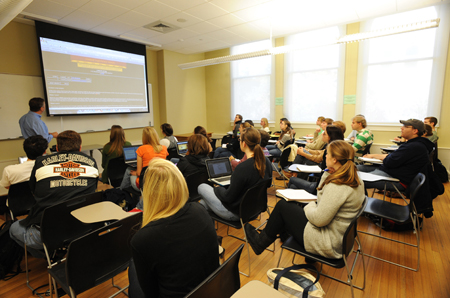| << Chapter < Page | Chapter >> Page > |
While it is clear that education plays an integral role in individuals’ lives as well as society as a whole, sociologists view that role from many diverse points of view. Functionalists believe that education equips people to perform different functional roles in society. Conflict theorists view education as a means of widening the gap in social inequality. Feminist theorists point to evidence that sexism in education continues to prevent women from achieving a full measure of social equality. Symbolic interactionists study the dynamics of the classroom, the interactions between students and teachers, and how those affect everyday life. In this section, you will learn about each of these perspectives.
Functionalists view education as one of the more important social institutions in a society. They contend that education contributes two kinds of functions: manifest (or primary) functions, which are the intended and visible functions of education; and latent (or secondary) functions, which are the hidden and unintended functions.
There are several major manifest functions associated with education. The first is socialization. Beginning in preschool and kindergarten, students are taught to practice various societal roles. The French sociologist Émile Durkheim (1858–1917), who established the academic discipline of sociology, characterized schools as “socialization agencies that teach children how to get along with others and prepare them for adult economic roles” (Durkheim 1898). Indeed, it seems that schools have taken on this responsibility in full.
This socialization also involves learning the rules and norms of the society as a whole. In the early days of compulsory education, students learned the dominant culture. Today, since the culture of the United States is increasingly diverse, students may learn a variety of cultural norms, not only that of the dominant culture.
School systems in the United States also transmit the core values of the nation through manifest functions like social control. One of the roles of schools is to teach students conformity to law and respect for authority. Obviously, such respect, given to teachers and administrators, will help a student navigate the school environment. This function also prepares students to enter the workplace and the world at large, where they will continue to be subject to people who have authority over them. Fulfillment of this function rests primarily with classroom teachers and instructors who are with students all day.

Education also provides one of the major methods used by people for upward social mobility. This function is referred to as social placement . College and graduate schools are viewed as vehicles for moving students closer to the careers that will give them the financial freedom and security they seek. As a result, college students are often more motivated to study areas that they believe will be advantageous on the social ladder. A student might value business courses over a class in Victorian poetry because she sees business class as a stronger vehicle for financial success.

Notification Switch
Would you like to follow the 'Introduction to sociology' conversation and receive update notifications?